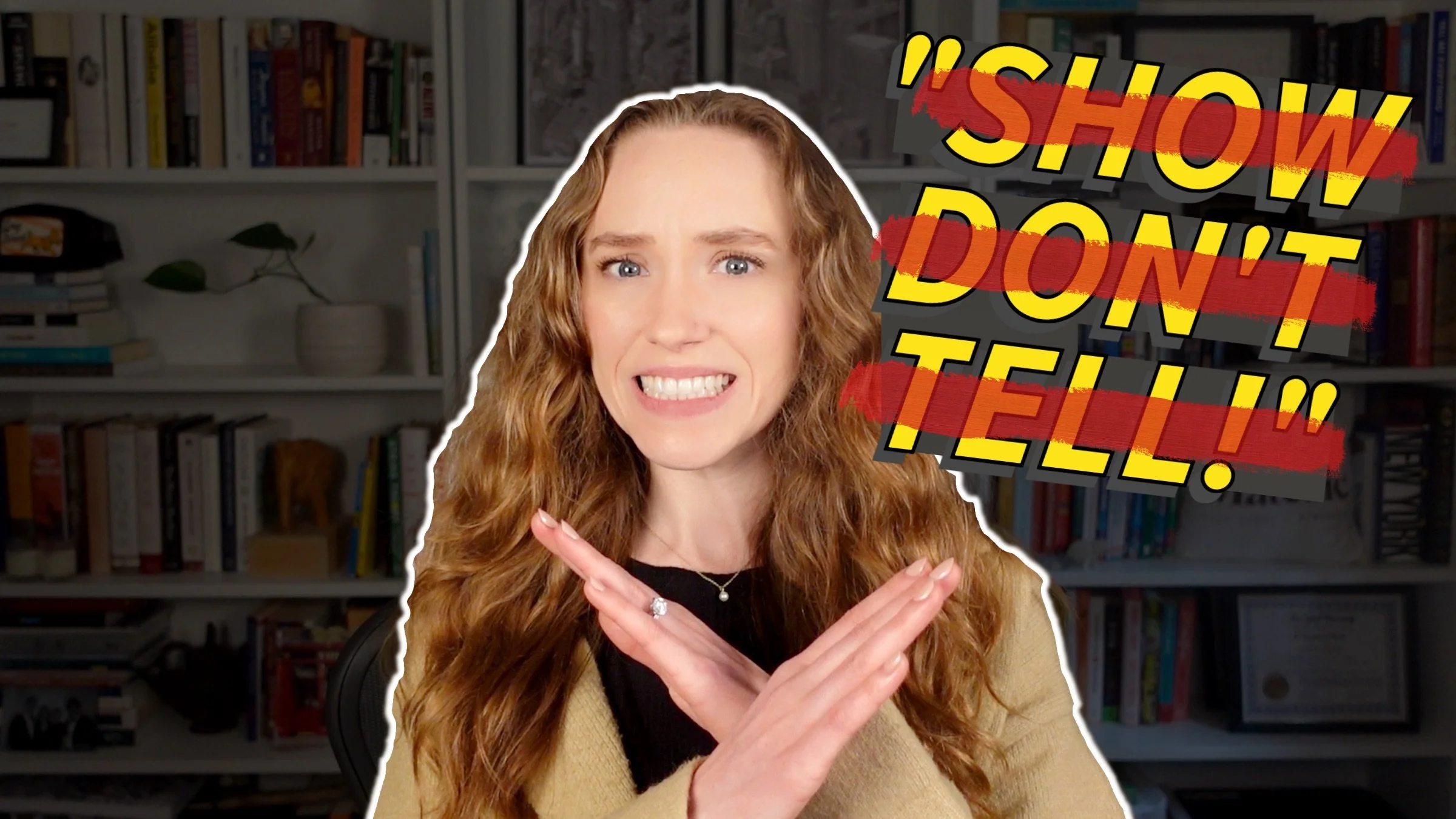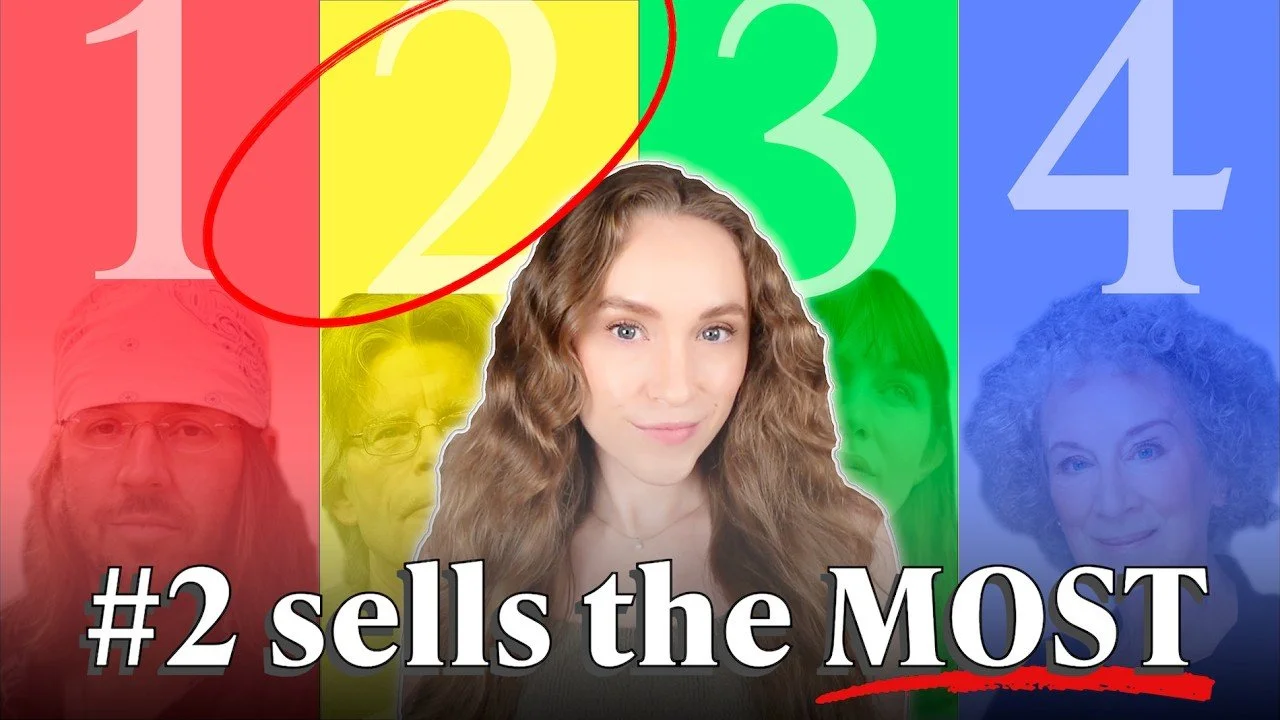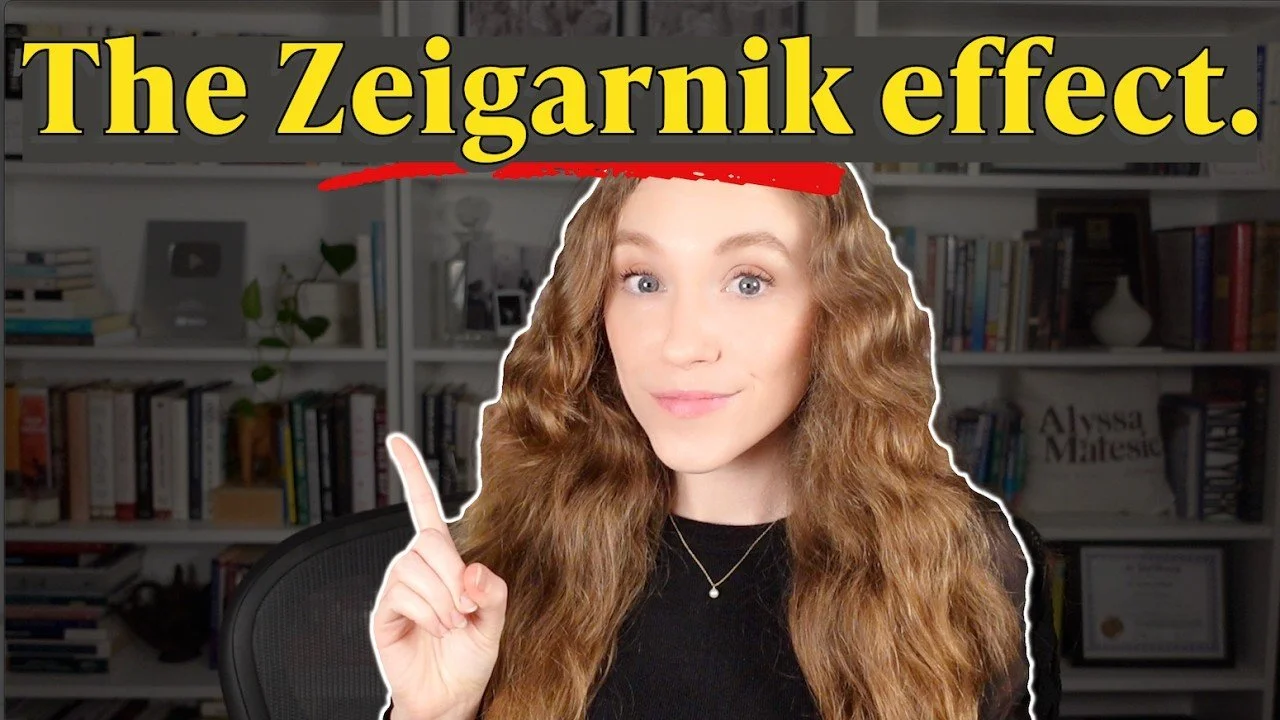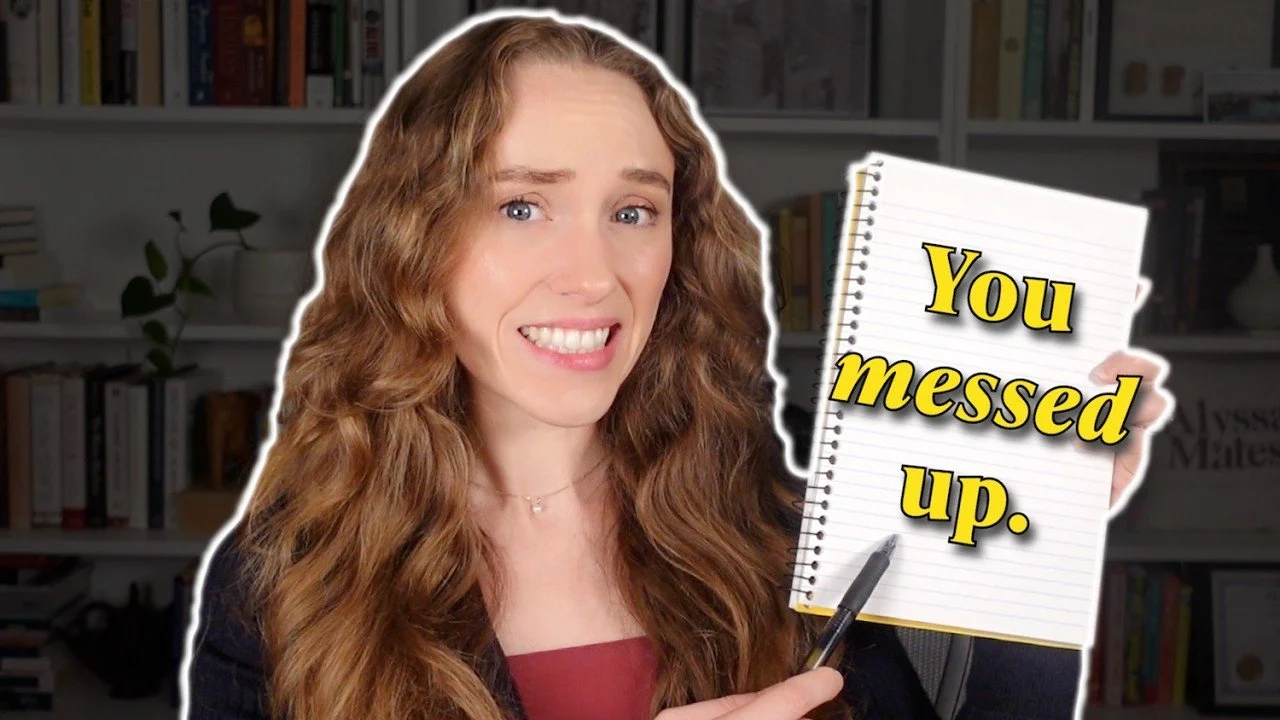Terrible Writing Advice You Need to Let Go of Now
HIT PLAY OR READ THE POST BELOW:
Show, don't tell. Write every day. Write likable characters. I'm sick of seeing bad writing advice like this go viral online. And while most of it sounds good in theory, it's often taken out of context, misunderstood, or taken too far — which can actually make your writing worse. I know what you might be thinking: "Wait, don't you give writing advice on this channel all the time?" I do. And I'm not saying I have all the answers, but I have worked at the biggest publishing house in the United States and have helped hundreds of authors strengthen their stories and get published. So here's my take on the seven worst pieces of writing advice you'll find online, and what I think you should do instead.
1. Show, don’t tell
Let's start with the most overused writing advice you've definitely heard before: "Show, don't tell." This isn't just the most common writing advice — it's also the most misunderstood.
Don't get me wrong; showing does help you craft vivid, immersive scenes and place your reader in your story. Instead of telling us, "Sarah was nervous," it's more effective to show her biting her nails, tapping her foot, or anxiously looking at the door every five seconds. From those gestures, the reader will be able to deduce that she's nervous. Showing is about not spoon-feeding things to the reader, letting them experience the scene and inhabit the character's mind and body.
This is all good, but here's where this writing advice often goes wrong: it doesn't mean you should never tell the reader things. Some writers, having heard the advice "show, don't tell" over and over and over again, are terrified that if they tell the reader anything, their story will come off as amateurish. I see it all the time in manuscripts I'm editing. Authors will focus so much on showing that the entire scene simply describes what's happening externally, on the surface, but they fail to reveal what's going on a layer beneath, in the character's mind. The result is a flat, static scene that doesn't land emotionally.
Sometimes, you should tell us what a character is thinking or feeling so we understand how they're responding and reacting to the events of the story. In fact, without those moments of interiority, the story will feel one-dimensional. The real skill is knowing when to show and when to tell. Both are critical to effective storytelling. So, the advice really shouldn't be "show, don't tell," but rather, "show and tell."
2. Only read from the canon
I see some version of this in my YouTube comments all the time. People will opine that you should only read the classics like Austen, Dickens, or Tolstoy for examples of how to write well. They claim that books written by contemporary authors are formulaic, all sound the same, and are terrible compared to the literary greats of yesteryear.
I definitely love some of the classics, but I couldn't disagree with this advice more. Reading the canon can absolutely help you understand story architecture, effective character development, and how to portray universal, timeless themes — but so can reading modern literature. There are so many authors writing today who deserve your attention. Here are some of my favorites. If you're convinced there's no author writing today whose work would interest you, I promise you just haven't read enough yet.
I think this advice is especially harmful if you're planning to publish your book. Because if you only read classic novels, you're not going to have a robust understanding of the genre conventions, literary styles, and themes that are resonating with readers today. After all, most readers going to the bookstore aren't picking up Wuthering Heights for their next beach vacation. So instead of limiting yourself to classics, I recommend reading widely from both canonical and contemporary authors. There is so much to learn about effective storytelling from across generations.
3. Write every day
Let me be clear: writing consistently is important. In fact, most successful authors do have some kind of writing routine or habit in place. But here's the key: it has to be sustainable for you, and every schedule looks different. Writing every single day simply isn't realistic or feasible for everyone, and it doesn't serve everyone's creative process.
For writers who are managing other responsibilities or who have personal circumstances that don't allow them to write every day, not being able to adhere to this schedule can lead to guilt and shame. That's the opposite of productive and could lead you to give up your writing practice altogether — the last thing we want. So, if writing every day just doesn't work for you, build a system that does, and don't feel guilty about it. Maybe you write for one hour three days a week. Maybe you carve out time on the weekends only. I even have one client who binge-writes in six-hour bursts once a week. It doesn't matter when you write, only that you write consistently. And if you just can't hit your writing goal one week, don't beat yourself up. In fact, sometimes taking a break from your story can be incredibly creatively energizing. It doesn't matter how you get to those final words "The End," just that you do.
4. Make your protagonist likable
It's a common misconception that your protagonist needs to be likable for readers to connect with them. They don't. They just need to be intriguing. Sometimes, in an attempt to write a likable character, writers will sacrifice depth, which is what actually makes us connect with the character. If your protagonist is too nice, too perfect, or too flawless, they won't feel authentic, and we actually won't like them at all. So don't be afraid to show their flaws, insecurities, secrets, vulnerabilities — their dark side. That's what makes them human.
Think about it: some of the most iconic protagonists in fiction are anti-heroes. Consider Patrick Bateman in American Psycho, Joe Goldberg in You, or Dexter Morgan in Dexter. These characters aren't likable at all (they're serial killers, after all) but they're magnetic. We're hooked by their voice, their intensity, their drive, their layers. Now, I'm not saying you should make your protagonist a serial killer (unless that's what you're going for, in which case, by all means, go ahead!), but you shouldn't confuse likability with flatness. We don't have to be your character's best friend, just someone who wants to follow along their journey.
5. Write what’s trending
These are the people who see the rise in romance right now and say, "See, this is what you have to write if you want to sell." But this is simply not true, and every publishing professional will tell you not to chase trends.
Here's the fundamental problem with this advice: publishing is slow. Really, really slow. By the time a genre goes viral on BookTok, it'll be too late for you to catch that wave. Even if you can write the draft quickly, by the time you get a literary agent, secure a book deal, and finally see the book on shelves, it'll probably be at least two years from now. Alternatively, if you self-publish quickly, you'll be competing in a saturated market with other writers who are trying to chase the exact same trend.
So, rather than writing what's trending, write what you feel passionately about. Write the story that's calling to you — the story only you can write. Don't force yourself into a niche genre just because BookTok says sexy meteorologist romances are trending right now. If you don't love what you're writing through and through, readers will feel that.
That doesn't mean you should ignore trends totally if they're working to your advantage. If you genuinely love a genre that's hot right now, go for it. But don't get caught in the whirlwind of trends — because after all, winds change. Trust that the right readers will find your story regardless. What's ice-cold right now might be red-hot when you go to publish.
6. Self-publishing is the only viable path
The internet loves extremes, so it's no surprise that you'll see people on Twitter, YouTube, or Reddit proclaiming that traditional publishing is dead and self-publishing is the only way forward.
Self-publishing is certainly a viable path and is becoming increasingly mainstream, especially with indie authors seeing a lot of success on social media. But traditional publishing still has massive reach as well and can help authors get bookstore placement, film deals, and high-profile book club selections. The reality is that both self-publishing and traditional publishing are totally viable paths, and each comes with trade-offs.
This advice about self-publishing being the only way forward often comes from people who feel they've been burned by publishing industry gatekeepers. Perhaps they queried literary agents and got rejected, so they feel bitter about the traditional publishing process. Then they go online and tout that it's impossible to break into traditional publishing and that no literary agents want debut authors. But that's simply not true. I've personally worked with many debut authors who have gone on to sign with top agents and get book deals with major publishers.
Rather than pitting self-publishing against traditional publishing, I wish we could talk about these two paths existing in the same forest harmoniously. Some people select this path; others select that path — but everyone has a nice hike. In fact, more and more authors are choosing to selectively self-publish certain books and traditionally publish other books.
Choosing your publishing path is a completely personal decision that depends on your priorities, your timeline, and your creative strengths — not to mention that there are even more ways to publish now than ever before, including publishing with a small press, hybrid publishing, or publishing via a serial platform. If you're not sure yet which path is right for you, don't worry — you have time. Just don't let loud voices online pressure you one way or another.
7. Replace editors with AI
The writing community is torn on AI. While the traditional publishing industry has been very reluctant to adopt it — and most publishing industry professionals condemn the use of generative AI for any creative function — writers, especially some here on YouTube, seem more curious about the capacity for AI to help them write their books.
I've seen authors talk about using AI to brainstorm plot points, develop characters, or even draft scenes. Now authors are also using it during the editorial process, plugging their manuscript into a chatbot and asking it to improve their writing. Some programs will even give you an AI-generated score or report evaluating aspects of your writing and story. So why work with a human editor when an AI program can give you feedback on your manuscript instantly, either for free or for a negligible fee?
I'm biased on this because I'm a professional book editor, but I truly believe that AI cannot replicate what a human editor brings to the table: nuance, context, intuition, and a deep understanding of story. We understand subtext — not only what's on the page, but also what's not on the page. We understand how to bend voice and style, and how to experiment with literary effect. We know what readers of your genre will expect to feel when they engage with your story, and what beats and choices will deliver that experience. We're able to identify what thought-provoking questions your story is raising, and what themes will resonate. Ultimately, we help you see how readers will respond to your story — both positively and negatively — and how to make it even more emotionally powerful.
Can an unfeeling AI chatbot tell you how to write a story that will make readers cry or laugh, or run and tell all their friends that they need to read it immediately? You tell me.
You'll find no shortage of writing advice online (including on my channel) but don't take all of it at face value. Ultimately, writing is an art form. There is no one-size-fits-all approach, so take the advice that resonates with you and throw away the advice that doesn't.






